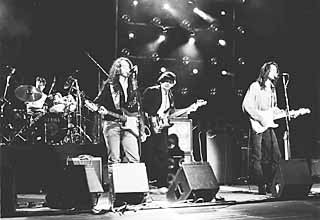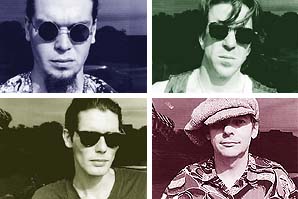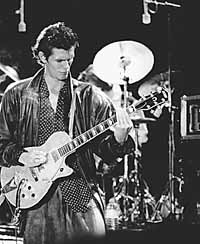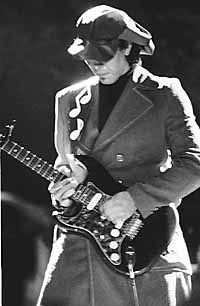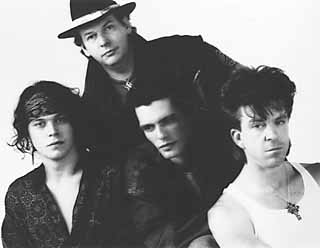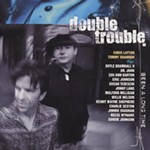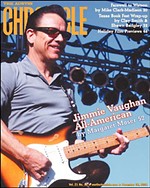Living in a Dream
Too Many Ways to Fall
By Andy Langer, Fri., May 14, 1999
|
|
Layton: After we signed to Geffen, we immediately started putting together material and playing as often as we could. From the beginning, we were packing clubs and making money, so that gave us time for Charlie and Doyle to sort though their material and see what would be good for the four of us.
Sexton: From the start, there was a lot of trying to monkey-wrench things in there. I thought it was very important to radically push the envelope -- to get Doyle and I to do our best and get Tommy and Chris to kind of take a step off their normal path. Unfortunately, often to my own detriment, I have these musical goals that are ridiculous. And when I feel like it's not blowing my mind or everyone's mind, I get frustrated. I don't care about politics in a band. I tried to explain that. I said, "Listen, I'm not saying I have to be the boss, but democracy doesn't work in government and it sure as hell doesn't work in bands." It's a jerk thing to say, but it's really true. There doesn't have to be a "leader," but somebody has to say, "Let's go this way," or "Let's go that way." Almost from the start, there weren't a lot of people willing to say, "Okay, let's try that."
Bramhall: At first, I think the lack of communication did have a lot to do with having two front people. I was young and it was the first situation where that many people were coming out to see me. I was getting that kind of attention, and wasn't really ready for it or how to deal with it. I think there was a lot of miscommunication and I have to own up to my part of it and say I wasn't a communicator then. I always held stuff inside and didn't say exactly what I meant all the time. A lot of it was that I couldn't communicate with people and be put on the spot.
Shannon: In all honesty, it was a pretty fragmented band, even early on. But it got more fragmented when we started taking it seriously. Everyone was real headstrong about where they wanted to go with it. Everyone had their own idea about what they thought the band should be doing. My idea was to first get Charlie and Doyle together. If we could do that, I thought the rest of it would be easy. I guess that comes from playing with Stevie -- if everybody is communicating and gets along, then it automatically goes where it's supposed to. But it was obvious from the beginning that none of us were communicating. And if you don't have the foundation steady, you can't build anything on it. We never had a steady foundation. We were earthquake mode all the time.
Layton: I came into it with a lot of, "Let's do this. Let's do that." I think I was a real irritant. I jumped in there and tried to do things and probably caused problems. Had I left well enough alone, they might have worked themselves out. But it's not my nature to do that. Everything I saw, everything we were doing, I saw something we could do with it. Ideas, visions, whatever. Then everyone else had their own ideas. At the time, I considered it good friction. I saw a good creative, competitive spirit kind of thing. When everyone acquiesces to everyone else, you find yourself going around in a circle. Somebody either emerges as the single dominant force or you have strong dynamic band where it constantly shifts. We had four people that had a lot of good ideas, but that it happened so quick compounded everything. When meaningful things like deals and money come across the table so quick, it doesn't give you chance to lay any groundwork or get your footing. All of a sudden, you're caught in the storm and all hell could break loose at any moment.
Sexton: The bottom line is I knew things like that take development to make it work. The newness of it all and stylistically what Doyle wanted to do and what I wanted to do -- look at his record for Geffen and The Wishing Tree. We had to take pieces of those two things and make it work. He was really into the Sly Stone kind of stuff, which I could appreciate, but didn't feel comfortable with. I was ultimately the black sheep in that band, because I was always throwing stuff into it that probably wasn't appropriate given the makeup, but I didn't know what it would do. Maybe they would come into it and turn it into what it needed to be, or it wouldn't work at all. I wrote a lot of bad songs in the early days of the Arc Angels.
Shape I'm In
Shannon: When it came time to make the record, it came down to John Paul Jones and Little Steven [Van Zandt] as producers.
Bramhall: I wanted John Paul Jones, but I was outnumbered.
Sexton: I think a lot of the John Paul Jones appeal for us was really just the cool factor. We did get to play "Days of My Life" with John Paul and it was amazing. He's like, "You want to play?" I couldn't believe it. But I knew if we were going to do this, we'd need someone to come in and pull it together in a way nobody in the band can. I knew Steven could deliver.
|
|
Shannon: Steven is the one partially responsible for making us a band. When we first got together, it was like two different bands. Doyle would do his stuff and Charlie would do his thing. Steven's the one that started having them switch verses and that in itself brought out a big change -- Doyle and Charlie started communicating more. Somebody from outside had to give us that push.
Layton: Just before the record came out, we went to Los Angeles for a couple days. I couldn't believe it. Geffen had all these different things planned for press, radio, etc. We cut 60 radio IDs and for three or four days did nothing but IDs, interviews, and photo shoots. They had it all together and I was really impressed. I remember thinking, "What's going to happen here when the record comes out?" It was exciting to see something that well-orchestrated.
Bramhall: At the time, I took a lot for granted. I thought it wasn't enough. Our first tour, when the record came out, we had tour buses, were selling out large clubs, and doing Letterman. But for every 1,000 records we sold, I thought we should have been selling 20,000 records. For every 1,500-seat club we played, I thought we should have been playing 8,000-seat places. I was blinded. I took it for granted that we had it so good, because on my planet I was a much bigger star.
Sexton: Doyle's never told me that he thought there should have been more records sold and more people there, but it makes sense. I can see from the way he acted. He got right into it. For him, I think his dream of what it was going to be and reality were different. The rest of us had records out before and played to eight people when we thought there should of been 80. Plus, we were all aware of what was going on in the industry at the moment -- nothing but rap. There was nothing really with a guitar at the time -- no rock & roll. And for some reason, this rock & roll band was the only thing that started to creep up in a landscape of turntables and samplers.
Layton: The road work was never easy. We knew about Doyle's problem. At first, he tried to be secretive. But I also remember when we were going to a gig in Houston early on, Charlie was driving and I was in the first bench seat in the back. Doyle was all the way back and I look around and he's a got a toilet paper roll he's smoking from. Whatever Doyle does, I can't help but love the guy. There's something about him. Even when he'd do stuff that would make anybody mad, I can't get mad at him for some reason. And so I look back at him like, "We're in a van, with the windows rolled up, and you're smoking? What is that shit?" And it was like, "Wait a minute, I know what that is. I've been around this. When it burns, it's fucking heroin." Then, Charlie's like, "What the fuck is that smell?" Doyle had hid it by then, but Charlie knew. He was like, "Oh man," with his head in his hands. That's all that was said about it, but things kind of escalated from there.
Sexton: I might have put my head in my hands back then, but a year and half later on the road, that's when I started saying, "Guys, I can't deal with this shit." It was like we needed a couple of therapists on the road for everyone but Doyle -- so we could all could figure out how to deal with him.
Shannon: It hurt to see it going on, it really did. It broke my heart. I had over four years of sobriety at the time. On the other hand, I understood it, because I'd been through it. But I wasn't angry or even confused for that matter. I loved him, I always have. I knew him since he was 13 or 14 years old. I was just praying he'd make it through, because not everyone does.
Bramhall: I was pretty far gone pretty fast and preoccupied with something else other than music. I'm sure it made it more difficult for them, but at the time, it made it easier for me. That's what I thought anyway.
Shannon: There was a little yelling after the shows sometimes. The shit would hit the fan now and then. Then again, everyone keeping it contained was part of the problem. If everyone had just come out and screamed exactly what they were thinking about each other and the situation, it probably would have had a more positive than negative effect. The worst thing that could have come from that is that we'd have broken up right then, which probably would have been less painful than how it happened. It never turned out that way, though. There was always this secrecy about it, this holding in. That was always the frustrating thing for me.
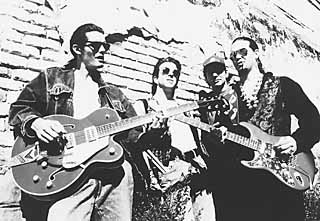
Layton: When Doyle started smoking heroin, it was like, "Oh god, do I need to go through all this again?" Once you know someone's so committed to drugs, you don't have to see it, or have it really screw things up outright to know it's a time bomb that will go off at some point. It's not like it's probably going to get better.
Bramhall: My drug habit wasn't the only source of the friction, but it magnified it to the point where the band couldn't function anymore. If I had stayed straight, we might have gotten four years out of the band and made two or three records. Who knows? I don't know how long it would have lasted, but it would have been longer than it did. I think the stuff that I was doing made me an angrier person and more distant. When I was doing it, I completely isolated myself, which in turn created more friction. But I don't think it was completely the source of our problems. It didn't start with, "Oh my god, he's doing [heroin] -- that's all of our problems."
Layton: Doyle got to a point where it was suggested he clean up. He went out to the Betty Ford Clinic, but the significance to the band's business was that "Living in a Dream" had just finished at radio and it was the perfect time for "Sent by Angels," Doyle's song. We talked about a video and the producer and that's when Doyle went into rehab. We lost a lot of momentum, but it was just life. Doyle's health was more important. We'd had to get him cleaned up and get back into it with Plan B.
Sexton: At the same time as Doyle's rehab, we had a Bryan Adams tour scheduled for Canada. I still get people that say, "Damn it, we bought tickets for that thing -- we drove 50 hours to see you and you weren't there." The intervention and rehab went down like a week before the gigs. We were all hoping things would settle down by then, but it was clear he wasn't going to make it. We'd already had a few sketchy border crossings, and I think the reasoning behind that intervention was that nobody could talk to him any other way. He wasn't ready. It was too soon, but the bottom line was he wasn't doing too good.
Shannon: It takes over. It takes over everything. Nobody should tolerate what a person does under the influence and ultimately everybody is responsible for their own actions. But it's harder when you don't understand what the person's going through. Most people probably think, "Why didn't he just get his shit together? Why didn't he just stop?" It's not that easy.
Sexton: I thought we really gave it the ol' college try as far as sticking it out. It wasn't like the first time it went weird anyone went, "Fuck you guys, I'm going back to being a solo artist." The thing is, to have any form of a successful record, you have to really work hard. Working hard may be visiting four radio stations, which isn't exactly ditch digging, but after three months or so of playing gigs, driving all night and hitting radio, it really feels like work. But because it was working and taking off and we knew how tough it was, we felt it was worth staying with. If something's happening, it's like, "Jesus, let's make it work." But it was like digging a hole for a week and filling it back in.
Shannon: Eventually, I became a spectator. It's not like I gave up on the band or Doyle and I became so discouraged or frustrated that I blew it off. It wasn't like that at all. I just took more of an attitude of, "I'll be here. Right here. If I can help, great. But I'm tired of wallowing in the shit. It's not good for me or anybody else. I'm just gonna watch." None of it was making sense anymore, and I started realizing there wasn't shit I could do about it either. I just got out of the way.
Sexton: For that last three months of the band, I felt like I was working double time to entertain the crowd, covering this and that. There were times Doyle wouldn't sing and would mumble between songs -- these weird raps fucking with people in the audience. He was like the drunk uncle at the Christmas party or the one bigot at the dinner table. But the thing with Doyle wasn't so much that I was mad, just really sad at him. I remember being in the hotel room and calling Tim saying, "Look I got an offer to play on so-and-so's record who's horrible, but I want to do it because I'm so miserable." It was like my cry for help.
Layton: Pinpointing the end is easy. It was at Town Lake and we had 12,000 people or something there to see us headline and we're supposed to go on in four minutes and Doyle isn't there. He showed up looking skinnier than me. He looked horrible, his face all sucked in. He looked like he could die right there. I don't know why, but I hadn't seen him in a few days. He went downhill quick. It was like he sat around shooting heroin for a week and nothing but.
Sexton: I remember standing on the stairs stageside and waiting for Doyle to show up. That kind of shit drives me crazy. We'd all been working hard, and in the back of my mind I still had that thing, "I've got to achieve this. We're running out of time." It wasn't about the time of day, just the time of life and the expectations that this band would happen. And when he shows up, he was skinnier than me, and I'm skinny. He was 50 pounds lighter at least. He was green. I thought he was going to OD on stage. It was weird, he was not the same guy.
Bramhall: I know the only reason I did that gig was because I knew I'd get paid for it. But all I remember is that when I finally showed up for the gig, everyone from old friends to the band itself were looking at me differently. I remember the look on their faces more than anything. I definitely saw something different in the mirror than what other people saw. I didn't look that bad to me, but I was obviously unhealthy. A friend of mine came over to my house one time, took one look at me and said, "I'm gonna go get you a box." He said it over and over. That's how bad I looked. And I remember walking up to that show and every person I saw looked like they'd seen a ghost.
Sexton: Hope is what keeps every band going, regardless of what you're talking about. All along, there were big cracks developing in that hope. But that gig became the big gaping fault. It was the final shift in the bedrock of hope. You can't put it all on the drugs, but anybody that says drugs didn't break up the band is skirting the issue totally. That's my opinion. There was definitely something fundamentally wrong with the band because of the variation and differences of opinion, but that was the beauty and the course all along. The world is fundamentally wrong and it hasn't spun out of orbit. It all had to do with the hope. I hate to sound like Martin Luther King or something, but when we saw Doyle wasn't going to come around it became pretty clear it was over.
See What Tomorrow Brings
|
|
|
from top: Charlie Sexton |
Bramhall: I always wanted the band to break up before I quit, but essentially I quit. But this way, I didn't actually say the words "I quit." At a certain point, I was so dysfunctional that I couldn't show up. And when the band broke up because of it, I sort of felt like I had no responsibility. I just didn't give a shit at the time. It was "Good, I'm out." That's what I wanted.
Shannon: We knew it was unique combination of all of us that made that band. A couple people asked if we'd want to go on with somebody else, but it wouldn't be the same band. That was a very clear decision. It was kind of like the chemistry of one-plus-one-equals-three when you get it right. We had all these people calling saying, "Why don't you let me try out?" They assumed we were going to stay together. And it was like, "There ain't nothing to try out for anymore."
Sexton: Me and Double Trouble or us and some other guy wasn't interesting. Do we get some guy that's full of shit and throw him in there just because he can play the guitar and sing? Had the band been together for six years and three records and then Doyle fucks up, maybe -- and that's a big maybe.
Layton: The band was over, but we owed a merchandise company, Niceman, a bunch of money. In our business, it's the one advance that stands as a personal liability contract. They said we could cut them a check from each of our own pockets, or we figured we could play and sell merchandise. And it wasn't like it was horrible thing to do. It wasn't for me. It didn't feel disingenuous or like a sellout. Any day of the week this band wanted to play, I was ready to play with them. Every band has its aggravation. If you were somebody who said all along, "I'm glad I'm done with that fucking band -- I can't believe I was in that band that long" and went back, then maybe you're selling out. I thought playing more shows as the Arc Angels was great. I had no problem with paying off a serious debt, too. Should I go play 90 gigs at Antone's instead to pay it off?
Bramhall: Did I do those show for money? I didn't do them for my health or for fun. I wasn't in a fun place at the time. I remember getting a call from Mark saying we had to do these shows or we had to pay out some good money. But I remember having a lot of fun even though I was still abusing myself. Because other than the money we owed, there wasn't a lot at stake. There were no strings. They were loose and we could pretty much do whatever we wanted.
Layton: I remember those final shows being really successful. I felt like, "I'd love to see this band go on. I realize it can't and this is it." I got real emotional about it. The last gig at the Backyard, I felt like I was going to cry during the last song.
Shannon: The second record would have been the one. The record company was really behind the band. They were doing everything imaginable. They really believed in the band. Even Dave Geffen himself said something like, "This band is really going to be big." The momentum was really climbing, you could feel it in the air. But there was always one thing going on "out there" and another going on "behind the lines."
Carry Me On
|
|
Bramhall: Charlie and I began working a little together again in '95 and '96. He let me use his studio a lot when I was in town and writing songs for my last record. Working like that, without a band, I think we actually found something there -- or at least I did. I think there was a new respect that I didn't know or see when we were together.
Sexton: It was probably the beginning of our actual relationship. At the beginning, it all happened so fast. We didn't know each other well and then, "Boom," we're in a band. So while I always liked Doyle, now I love him.
Bramhall: I went through a period in '96 when I was doing my solo record for Geffen. After I made the record, I was supposed to tour for it, but the record company didn't want to put anything behind that touring. There wasn't the kind of financial commitment to my solo career that there had been for the Arc Angels. Since I didn't get much for my solo record from the company, I started thinking, "God, I could have stayed in the Arc Angels. If this wouldn't have been this way, we could of made our second record." I think if we had stayed together even three or four more months we could have gone gold. Thinking about that, and how close we were to being really big and all the missed opportunities got me nowhere. [Getting back together] wasn't a consideration or possibility anymore and to keep dwelling on it wasn't going to do me any good. But it really wasn't until then that I realized how good we had it. I didn't even know.
Shannon: There was a time where if somebody had said let's have an Arc Angeles reunion, it would have been "Fuck you, I'm not going to do that." I think our breakup had that -- that "These guys wouldn't ever play with each other again" feel to it. But a year or two ago, we were playing this Mighty Zor gig at Antone's and there were a lot of people around asking Charlie to show up and jam. Charlie said he "might" show up and I thought, knowing Charlie, he wouldn't. It was the nice way of saying, "No, I don't think so." I was really happy and surprised when he did. It was a lot of fun. I think it planted the seed. It was the first time everyone was having fun and open to the possibility of actually doing the reunion.
Bramhall: The Mighty Zor gig was fun, but more fun in a nostalgic way than musically. I don't think Charlie and I remembered half the songs that we did. Musically, it was not the best thing we'd ever done. But excitement-wise, from the crowd and the fact that there was nothing invested -- we were just playing together -- it was a lot like the first show we ever did. We got onstage and people just went mad. It was like, "Where the hell did this come from?" and "Shit, here it is again." I don't think it even mattered; Charlie could have come up with a banjo and I could have played a flute and it would have been nuts, like "Oh, that's even cooler." Hell, we probably could have done a version of "Greensleeves."
Layton: For whatever things that plagued us, no matter how minor, petty, unimportant, or otherwise, the things that we've done together recently and that we've all gotten older seems to have melted a lot of those issues away. We know that we can play together and that we make good music together, so it's an easy thing to do. It's so easy. It's like if you can walk up to the pool, fall in, and be refreshed, why not do it?
Sexton: It was an offer to do a private party that got the whole reunion thing moving, but there had always been something like that there for a year or two -- some form of carrot. I really didn't start considering until a few months ago, after I started working with Doyle on his new record. And Doyle and I were always the holdouts. We'd both joke about it like, "Damn it, they're asking us again." There was communication about that, which was funny because there was never communication about anything else.
Bramhall: Charlie has his record, I've got mine and Double Trouble has theirs, so if we wanted to do it, it had to be now. And we know there's nothing that will happen from this except these gigs. I told Mark we should try to get as many as possible, because it's probably going to be a really fun thing and if we can play and people can see it again, we might as well get to as many people as possible and line up as many gigs as we can. And it's funny, because for a long time I found the Arc Angels embarrassing. I was ashamed. It was my ego and I think it was a defensive thing, like "Oh, that thing screwed up and I was partially responsible and I don't want to admit it. I want to cut the line and get as far away from that kind of music and that thing as possible." But my thinking has changed completely. Hindsight is 20/20. In retrospect, it was a great thing and it did a lot for my career. And I didn't embrace it properly before. I am embracing it now and will continue to. It is a part of me.
Shannon: I'm glad Doyle and Charlie get along so great now and I'm grateful Doyle made it though all that and is healthy. Back then, I think everybody thought, this just grows on trees, that you can have this any time you want. You know, "We can make a record, everybody will go crazy over it, and all the girls will go wild." I think that was kind of the internal impression, and I think hard reality caught up with everybody. It doesn't grow on trees. It's not that easy to get something good going. We had a good thing with the Arc Angels.
Layton: I think we helped each other out and complemented each other better than we even knew. Everybody had something really substantial to contribute at one point or another, in some form or fashion, and I think it would be hard for any one of us to put together another band where you could say, "That's way better than the Arc Angels were." I don't know that's possible.
A few tickets still remain for the Arc Angels reunion shows at Dessau Music Hall May 21 and La Zona Rosa May 22. Tickets for a third show, at La Zona Rosa May 28, go on sale this Saturday at 10am.





